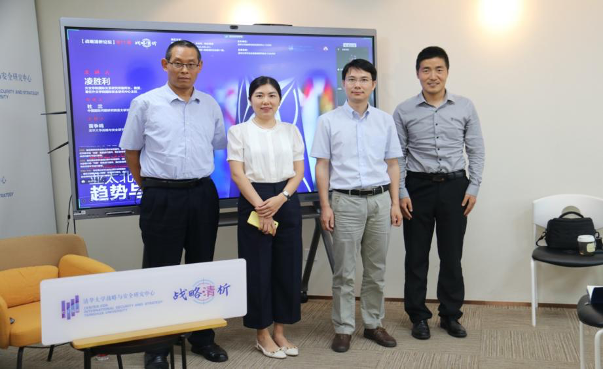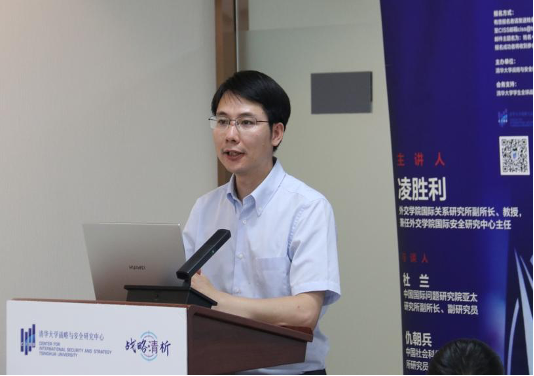On June 27, the 11th StratFocus Forum of the Center for International Security and Strategy (CISS) of Tsinghua University themed “‘NATO-ization’ of the Asia-Pacific: Trends and Limitations” was held, where Ling Shengli, Deputy Director of the Institute of International Relations at China Foreign Affairs University, was invited as the key speaker, and Qiu Chaobing, Research Fellow of the Institute of American Studies under the Chinses Academy of Social Sciences, and Du Lan, Deputy Director and Associate Research Fellow of the Department for Asia-Pacific Studies of the China Institute of International Studies as panelists. They exchanged views on the regional security situation together. The forum was moderated by CISS Postdoc Fellow Dr. Miao Zhengming.

Qiu Chaobing, Du Lan, Ling Shengli, and Miao Zhengming (from left to right)
Starting from the U.S. latticework of alliances and partnerships, Ling Shengli pointed out that the United States, guided by the so-called “Indo-Pacific strategy”, had pursued “small circles” in the Asia-Pacific region in recent years. This pursuit involves a growing trend of multilateral military alliances on military, economic, and political fronts. However, Ling argued that the U.S. had actually attempted to promote multilateral alliances in the Asia-Pacific region since the early days of the Cold War, but its efforts were hindered by limited strategic resources. That’s why the so-called “NATO-ization of the Asia-Pacific” is currently a fluid trend. Ling further suggested, although the new geopolitical strategy of the U.S. was not favorable to China, China’s crucial role in the geo-economics could not be denied. Besides, the dividends of “long-term peace” in the Asia-Pacific region should prompt U.S. allies to reconsider their policies towards China, and they would not follow the U.S. blindly. The “NATO-ization of the Asia-Pacific” may not necessarily unfold as the United States desires.

Ling Shengli, Professor and Deputy Director of the Institute of International Relations at China Foreign Affairs University
In the following, Du Lan and Qiu Chaobing shared their views. Du believed that “NATO-ization of the Asia-Pacific” could be traced back to 2007 when the former Japanese Prime Minister Shinzo Abe proposed the so-called the “Arc of Freedom and Prosperity” based on Japan’s Quad partnership with the United States, India, and Australia. She argued that the U.S. was exerting efforts in both “NATO-ization of the Asia-Pacific” and “NATO’s Pivot to the Asia-Pacific.” Following the Ukraine crisis, it has swiftly advanced the restructuring of the Eurasian alliance and focused on the synergy between the two sides under the guise of Eurasia security linked with each other. Du concluded by suggesting that, despite the significant changes in the security situation around China brought about by great-power competition, we should pay attention to the strategic autonomy of Asia-Pacific countries and the impact of China’s own policy measures. It is important to avoid falling into the mindset and discourse traps of camp confrontation while striving to secure more diplomatic space.
Qiu Chaobing’s perspective revolved around the shift from the “Asia-Pacific” to the “Indo-Pacific”, which he saw as a change in the U.S. strategic vision. However, when looking at the history of U.S. foreign strategy since the end of the Cold War, Qiu argued that its strategic objectives had remained highly consistent without fundamental changes. He also suggested caution in using the term “NATO-ization of the Asia-Pacific.” The history of NATO, according to Qiu, demonstrated its concerns extending beyond a specific region towards “globalization”. Furthermore, he analyzed the interactions between the United States and its Asia-Pacific allies in recent years, emphasizing the need to go beyond the traditional understanding of alliances to comprehend the current nature of U.S. partnerships and alliance networks.
